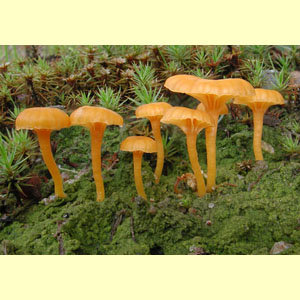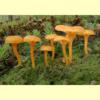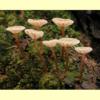
images/Lichenomphalia/Lichenomphalia_chromacea_KRTsn.jpg
Small to medium agaric, growing on the ground, rarely litter or mulch or wood, with a white spore print. Pileus pale, yellow, orange or brown, dry or moist. Lamellae decurrent, rarely adnate. Stipe central. Partial veil remnants absent. Spores hyaline, non-amyloid, smooth; germ pore absent. Cheilocystidia absent. Lamellar trama interwoven. Pileipellis a cutis. Clamp connections absent.
Lichenomphalia always grows on an algal mat, and at the base of the stipe there are specialised structures in which fungal hyphae envelop algal cells. It is therefore a lichenised fungus (lichen), one of the few Basidiomycota to have this life-form. The only other lichenised agaric in Australia is
Marasmiellus affixus, which grows on an algal mat on wood. Among the smaller agarics with decurrent lamellae, in addition to being lichenised,
Lichenomphalia differs from
Arrehnia (with clamp connections),
Camarophyllopsis (with hymeniform pileipellis),
Loreleia (among bryophytes, only occurring after fire) and
Rickenella (with thick-walled caulocystidia).
Lichenomphalia Redhead, Lutzoni, Moncalvo & Vilgalys, Mycotaxon 83: 38 (2002).
Botrydina Bréb., Phytoconis Bory.
Three species: Lichenomphalia chromacea (= Omphalina, Phytoconis), L. tasmanica and L. umbellifera (= Omphalina, O. ericetorum).
W.A., S.A., N.S.W., Vic. and Tas. (and probably also N.T. and Qld).
In native forest. Some species in alpine areas.
On the ground, growing on an algal mat.
Lichenised.
Bougher, N.L. (2009a),
Fungi of the Perth region and beyond: a self-managed field book, Western Australian Naturalists' Club (Inc.), Perth. [
Description and
Illustration of
L. chromacea]
Bougher, N.L. & Syme, K. (1998), Fungi of Southern Australia. University of Western Australia Press, Nedlands. [Description, Illustration and Microcharacters of L. chromacea and L. umbellifera, both as Omphalina]
Breitenbach, J. & Kränzlin, F. (eds) (1991), Fungi of Switzerland. Volume 3. Boletes and Agarics 1st part. Edition Mykologia, Lucerne. [Illustration, Description and Microcharacters of L. umbellifera (as Gerronema ericetorum) from Europe]
Fuhrer, B. (2005), A Field Guide to Australian Fungi. Bloomings Books, Hawthorn. [Description and Illustration of L. chromacea and L. umbellifera, both as Omphalina]
Grey, P. & Grey, E. (2005), Fungi Down Under. Fungimap, South Yarra. [Description, Illustration and Map for L. chromacea (as Omphalina)]
Grgurinovic, C.A. (1997a), Larger Fungi of South Australia. The Botanic Gardens of Adelaide and State Herbarium and The Flora and Fauna of South Australia Handbooks Committee, Adelaide. [Description and Microcharacters of L. chromacea (as Phytoconis)]
Kantvilas, G. & Jarman, S.J. (2012), A new lichenised basidiomycete from Tasmania, Kanunnah 5: 106–112. [Illustration and Description of L. tasmanica]
McCann, I.R. (2003), Australian Fungi Illustrated. Macdown Productions, Vermont. [Illustration of L. chromacea and L. umbellifera, both as Omphalina]



